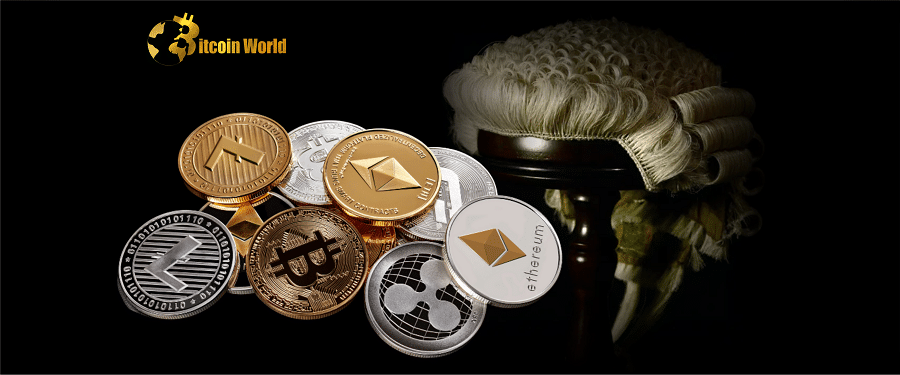The crypto world is buzzing after recent comments from Gary Gensler, the head of the U.S. Securities and Exchange Commission (SEC). In a nutshell, Gensler stated that everything in crypto, except for Bitcoin, should be considered a security and therefore falls under the SEC’s watchful eye. This has sent ripples through the industry, sparking heated debates and raising crucial questions about the future of digital assets. Let’s dive into what Gensler said, why it matters, and what the crypto legal experts are saying in response.
Gensler’s Bold Claim: Crypto is Security (Except Bitcoin)
In a recent interview with New York Magazine, Gensler didn’t mince words. He clearly stated that when it comes to cryptocurrencies, “anything other than Bitcoin” is likely to be classified as a security. This is a significant statement coming from the chair of the SEC, the very agency responsible for regulating securities markets in the United States.
But why this distinction between Bitcoin and other cryptocurrencies? Gensler explained his reasoning:
- The ‘Middleman’ Factor: According to Gensler, most crypto projects involve a central group or team. Investors are buying these tokens with the expectation of profits based on the efforts of this central group. This, he argues, fits the definition of a security under existing securities laws.
- Bitcoin’s Decentralization: Bitcoin, in contrast, is presented as different. Gensler suggests it lacks this central intermediary. He views it as a decentralized digital commodity, operating without a central group promising future profits.
To put it simply, Gensler believes that if there’s a team behind a crypto project promising returns, and you’re investing hoping they deliver, it’s likely a security in the eyes of the SEC. Bitcoin, in his view, operates outside this framework.
Crypto Lawyers Fire Back: “It’s Not the Law, Gary!”
Gensler’s pronouncements haven’t gone unchallenged. Prominent cryptocurrency lawyers and policy experts have been quick to refute his sweeping statements. They argue that Gensler’s opinion, while influential, is not the final word on the legal classification of cryptocurrencies.
Here’s a breakdown of the key counterarguments:
- Opinion vs. Law: Jake Chervinsky, a lawyer and policy lead at the Blockchain Association, emphasized that Gensler’s statements are just his opinion. As Chervinsky tweeted, “Gensler’s opinion is not the law.”
- Courtroom Proof Required: Chervinsky further pointed out that the SEC can’t simply declare every crypto a security. They need to prove it in court, token by token. “Unless and until the SEC proves its case in court for each individual token one at a time,” Chervinsky stated, “it lacks the authority to regulate them.”
- Judges Decide, Not Regulators: Attorney Logan Bolinger echoed this sentiment, tweeting that Gensler’s views are “not legally dispositive.” Bolinger clarified that “the meaning of the law and how it should be applied are ultimately determined by judges, not chairs of the SEC.”
In essence, the legal counter-argument is that Gensler is expressing his interpretation of the law, but it’s up to the courts to ultimately decide whether a particular cryptocurrency qualifies as a security. It’s a legal battleground, not a done deal.
Why Does This Matter for Crypto Investors?
Gensler’s stance and the ensuing debate have significant implications for the cryptocurrency industry and investors:
- Increased Regulation: If the SEC successfully argues that most cryptocurrencies are securities, it would bring them under much stricter regulatory frameworks. This could mean more compliance requirements, reporting obligations, and potentially higher costs for crypto projects.
- Impact on Exchanges and Trading: Crypto exchanges listing tokens deemed securities might face SEC scrutiny and need to register as securities exchanges. This could alter the landscape of crypto trading and accessibility.
- Innovation and Growth: Some argue that overly aggressive regulation could stifle innovation in the crypto space and push development overseas. Others believe clear regulations are necessary for long-term growth and mainstream adoption.
- Investor Protection vs. Overreach: The SEC’s stated goal is investor protection. However, critics worry about regulatory overreach that could hinder the development of a nascent technology and market.
The Road Ahead: Courtrooms and Clarity?
Jason Brett, policy director at the Bitcoin Policy Institute, aptly summarized the apprehension surrounding Gensler’s approach, stating his words “shouldn’t be praised, but feared.” The crypto industry is clearly concerned about the potential for increased SEC enforcement and the legal battles that may lie ahead.
The debate over whether cryptocurrencies (beyond Bitcoin) are securities is far from over. It’s likely to be decided in courtrooms, through legal challenges, and potentially through new legislation. For now, investors and crypto businesses are navigating a landscape of regulatory uncertainty, trying to decipher the implications of Gensler’s statements and prepare for potential shifts in the regulatory environment.
Key Takeaway: While Gensler has drawn a line in the sand, claiming most cryptos are securities, this is just the opening salvo in a larger legal and regulatory discussion. The crypto industry is pushing back, and the final outcome will likely be shaped by legal precedents and ongoing dialogue between regulators and the crypto community. Stay tuned, because this story is still unfolding!
Disclaimer: The information provided is not trading advice, Bitcoinworld.co.in holds no liability for any investments made based on the information provided on this page. We strongly recommend independent research and/or consultation with a qualified professional before making any investment decisions.


